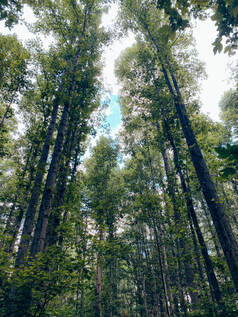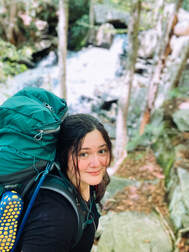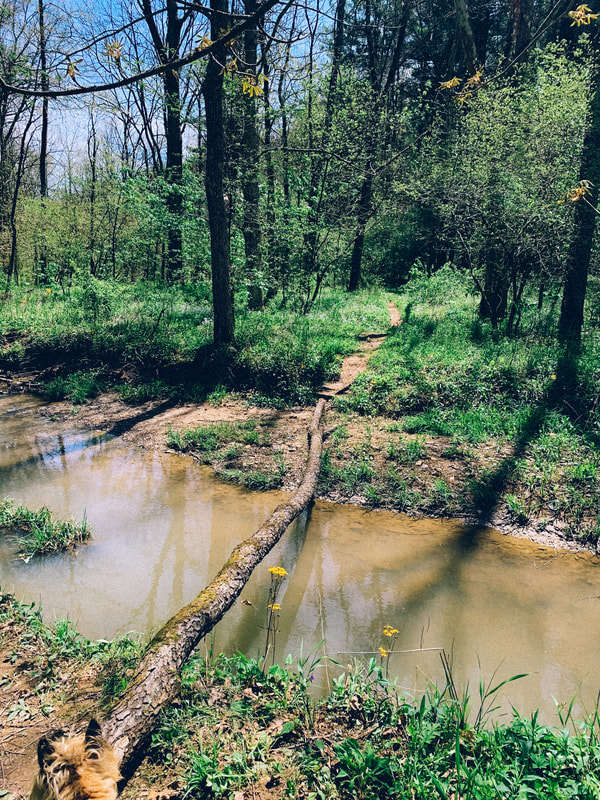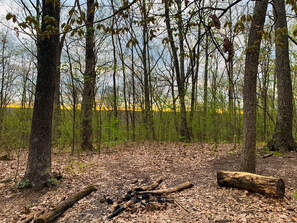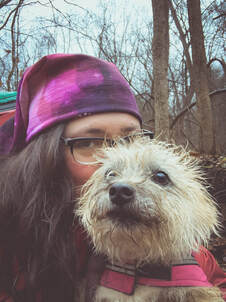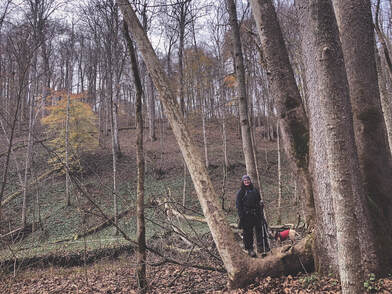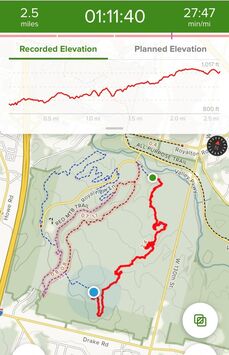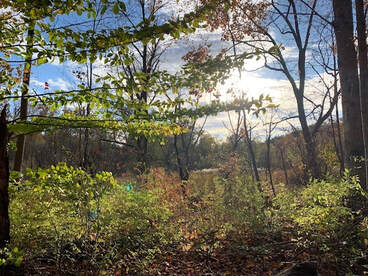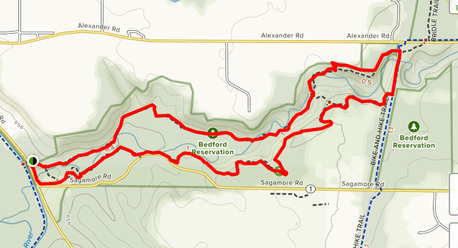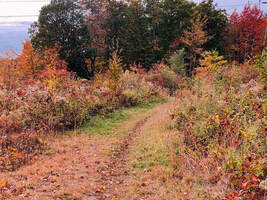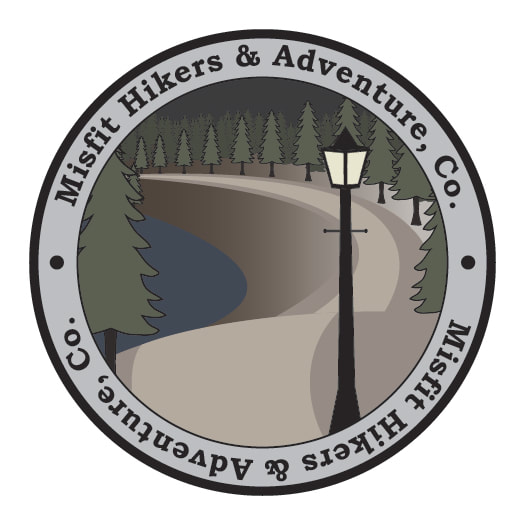|
I've been processing my last solo trip for a little while, which was to Wildcat Hollow in Southeast Ohio. I love Wildcat. It's challenging with elevation, lots of spots to stop, pretty, has bug out points, and is perfect length for a weekend. That's why I love solo-ing there.....correction....LOVED solo-ing there.
. The last time I stayed there I was down in the spooky-ass valley. I got there as dusk was falling, the camp I wanted to stay in was taken. So I'm in the mostly overgrown, super creepy camp spot. The ONLY spot I get icky vibes off of. Of course. And it was cloudy. SO ZERO LIGHT. . Whatever, I'm badass and awesome, so I just trundled off to bed with Lucy, my mostly fearless companion....and a book on tape to drown out my own imagination. . Let me say I felt pretty comfortable. I wasn't *super* creeped out, just my own imagination running wild. I fell asleep, feeling good. And then was awoken at 1:30ish to light beaming in my tent. WTAF. WTAF. WTAF. Bear spray in hand, I peered out. First thought was aliens. Second thought backpackers coming in late after work. But I could see them on the trail, about 40 feet away, flashlights in hand and stumbling along, no packs visible. Roads intersect Wildcat and they seemed drunk or high, so I guessed they were out there to party. My campsite was overgrown, and it was very foggy, so I figured they didn't see me (Lucy just crouched low to the ground and stared, not barking for once lol). I waited about fifteen minutes, prayed I wouldn't have to pee, and then snuggled back to bed with Lucy. Quite proud of myself, I'd like to mention. . Then the FUCKING GUNSHOTS STARTED. Two in the morning, and close. Like, it could be the guys kinda close. And not one or two, like 20 or more. I noped the fuck out after that. Lucy was losing her shit, terrified. I was afraid but not terrified, but I wasn't sticking around. I jammed everything in my pack, called my dad to come meet me at a random road, and hiked four and a half miles out. . There were a lot of things that ran through my head - one dude just murdered another and I was going to see a body that night (drug deal gone bad? illegal dumping? all of those things are present down there). Or, more likely, two drunk dudes illegally poaching deer. Didn't wanna run in to them doing that, either. I grew up 20 minutes from there. Not folks you want to run in to. . It was legit scary. But I'll tell ya what - I didn't panic. I assessed the situation, deemed it no longer safe to remain, and got myself out of the situation. And I don't feel bad for bugging out. I go in to every solo (and regular bp trip to be honest) with a solid foundation of what to do if shit hits the fan - what are the ways out of the woods? Who do I call? Do I have a means to get help if I can't get out? Do I have a means to survive the most obvious situations until help arrives? . These are all questions you should ask yourself - and have answers to - every time you go out in the woods, whether to hike or backpack, alone or with others. . In the weeks following my bug out, quite a few folks in my hiking groups have mentioned staying at Wildcat and the significant amount of gunfire they heard while there. Not just me. It's frustrating, but also good to know. . I WILL be solo'ing again, and I'll post some of my theories at another time. . What's the worst thing that's happened to you at night while backpacking? Solo or with others? How did you overcome it?
1 Comment
The other day, a woman in the hiking fb page I'm part of made a post about being frightened on the trail when she's by herself and asked how others stay safe. Probably a doze or more other women said they also really want to get out and hike, but they are scared to do it alone.
. Lots of folks chimed in, with lots of helpful tips. Nearly all the men (and a few ladies) said get a gun. Let me say this - I have no issues with gun ownership. However, very few folks out there are going to be well enough trained to pull a gun under duress/surprise attack and be able to shoot it accurately. I don't carry a gun because, frankly, I'm clumsy and I'm much more likely to get a twig stuck near the trigger and shoot myself. I read somewhere once that under a 100 hours on the range and don't even bother. . After doing some reading, carrying a gun without significant training and practice can also lead to a false sense of security. You have the gun, right? So folks often become lax in keeping up their other safeguards. . And while a number of guys chimed in that they, too, were scared when they first started hiking alone (kudos!), I was surprised to see woman after woman posting. So why so many women? Well, let's be real - society teaches women that it's dangerous for us to go out alone. Rape culture, right? Carry your keys, be aware of your surroundings, etc. It's a real thing. There's safety in numbers. Add the visceral fear humans have of the unknown AND being alone in the woods, and it's easy to see a stranger waiting to hurt us behind every tree. . What's also real, though, is (taken from the Bureau of Justice Statistics): - Females are generally murdered by people they know. - In 64% of female homicide cases in 2007, females were killed by a family member or intimate partner. - In 2007, 24% of female homicide victims were killed by a spouse or ex-spouse; 21% were killed by a boyfriend or girlfriend; and 19% by another family member. - In an additional 25% of cases in 2007, females were killed by others they knew. An estimated 10% of female murder victims were killed by a stranger. . I tried to google information about crime/attacks on women in National Parks, and frankly couldn't find any (I kept getting information about bison and bear attacks). I tried local state parks in Ohio, and came up with a grand total of 3 instances over forty years - a man with a mask approached a jogger on a trail, but she ran past him; a woman was murdered in a parking lot by someone she knew; and two children were taken to a park from elsewhere and killed. Horrifying. . There were other instances of violence in some urban metropark parking lots, but they involved those that went there for things other than hiking (drug deals, etc.). . Random attacks by strangers in rural areas is lower than those in urban areas. Can something happen on the trails? Sure, of course. Yet, throughout the day, we still walk to the store, go to the movies, take our kids to the park...go about our every day lives. And as we do, most of us don't actually take any precautions at all. We don't even think about it, if it's daylight. . I'm not downplaying these instances or fears by ANY means. But I do believe that you can be a woman (or man) and enjoy the trails on your own, without fear, by taking good safety precautions. We should make sure that our fear of being alone on the trail is proportionate and appropriate, not paralyzing or preventative. We're going to talk about these precautions later on this week. They're also good against animals, too, because to be honest you're more likely to have a run in with wildlife than a person. . Have a tip for safety on the trails when out there alone? Leave it below! Wild Cat Water - water water everywhere and not a drop to drink? Sorta.
A few people commented or sent messages regarding the water situation at Wild Cat Hollow in southeast, Ohio, for which there is a surprising amount of confusion based on responses to a post I made in a hiking group asking about it. There are quite a few streams which are running at Wild Cat right now, thanks to all the Spring rains. I would imagine that in summer/fall most of these streams would be dry. I carried 3 liters of water with me, just in case when I went, and I ended up filtering twice for more. HEAVY METALS: I didn't know this when I first started planning my trip, but southern Ohio used to be KNOWN for mines of all sorts. And while most of them are closed, the runoffs from the mines have tainted a lot of the water sources with heavy metals. This means that if you're going to filter water, you need to MAKE SURE you're filter will filter heavy metals (along with all the other icks in the water). Really, this is important. Heavy metal poisoning is a THING. And while there I saw a number of folks using the wrong types of filters. If you don't want to mess with filtering water, or taking a chance the streams might be dry, then there's another option - caching water. There's several roads that traverse Wayne National Forest (where Wild Cat is) and it's easy enough to stash a couple gallons of water. Make sure they're sealed gallon jugs, and put your name on it/initials, and "cached water" so people don't toss it. The downside is navigating those back roads to find a cache location, but if you use All Trails, you'll be able to find where road meets trail fairly easily. Lastly, people wanted to know what filter I use - it's the LifeStraw Flex with Gravity Bag Water Filter by @lifestraw. It's hella light, acts as a back up water bag, and yes, it exceeds the NSF 53 standard for reduction of lead and other heavy metals and NSF 42 for chlorine. What water filter do you use? For my first solo backpacking trip this past weekend, I went to Wildcat Hollow in southeast Ohio. A number of folks mentioned how much they want to do an overnight, but the idea of being out at night alone really freaks them out.
First, I am a HUGE scaredy cat of the dark. Despite my age, my imagination still completely runs away with me at night. Whether in my bed or out in the woods, I can imagine all matters of ridiculousness (and some not so ridiculous possibilities). It all started many years ago, when I was about 5, when my father would drive down the wood-lined dirt road to our farmhouse. He'd suddenly stall the car and say to lock the doors, the Gamork was in the woods (from the Never Ending Story), and then pretend to not be able to restart the car. Needless to say, it absolutely sparked my life-long creativity and story-telling....and also freaked me the fuck out about the dark. So how did I manage to get out there and make it through the night? Between Tin Can Man, coyotes, and no fire? And how the heck did I build up to doing it in the first place? There was a couple of freaky things going on that first night alone in the dark. The most realistic problem were the coyotes. They were really howling. And not too far off. In Ohio, even in daytime, you have to be careful. They'll come right after you - or your dog. Luckily, they just freaked out my dogs (who knew enough to stay quiet), and never got that close to camp. But their yips were definitely unnerving. I never did get a fire started, I got to camp RIGHT at dusk and all the wood was super damp. It just didn't happen. So it was a dark, quiet night at the beginning. I was actually doing okay, until....Tin Can Man. It was SO weird. So at like one a.m., there was this weird, scraping noise from the direction of the trail. Like someone with a bag of cans and other, heavy stuff. They'd pull it, then it would stop for a second or two like they were resting. The dogs and I were like WTAF, and I didn't even poke my head out. Lasted for about 20 minutes until it was way down the trail. It was really unnerving. Next day, the ladies at the camp before me passed me on the trail and I asked about it. They were still up. Apparently, it was NOT my imagination, but a dude on the trail with a load of scrap metal from the weird shanty down that sits abandoned deep in Wayne (though there were folks there when I passed it...the ladies said the squat there, but I'm not sure if they were squatters or campers). So there was that. I was glad I had dogs and mace, needless to say. So how did I stay calm and carry on? 1. (I think this was most important) I wanted to keep hiking over the winter, which with working full-time, that meant night hiking. I didn't realize it at the time, but it really acclimated me to being in the dark and every time I went out, and nothing happened, I got a little more comfortable. 2. It was a full moon at Wildcat, again not planned, but I think it helped tremendously being able to see without a light. 3. I downloaded several books on tape and several t.v. shows, and played them throughout the night, so the weird night noises didn't bug me or the dogs. I did have a battery pack to recharge my phone, and I think without the shows, I would have really just FREAKED out, because my mind would have focused on scary stuff. 4. I found a camp site on top of the valley, so I had cell phone reception. It was comforting knowing I could still reach the outside world. 5. My dogs were freaked out and needy, and I had to comfort them, which weirdly enough made me not worry myself. Cause they NEEDED me. Lel. 6. Sometimes, I would repeat a phrase from Stephen King's book, IT: "He thrusts his fists against the post and still insist he sees the ghost." I repeat it until I stop thinking about whatever it is I was thinking about. 7. And finally, my WANT to get out there, to go backpacking, to DO IT, got me out there. With no end in site for COVID, I didn't want to pause more of my life than I had to, while waiting to go with friends. So that's it! That's how I got through the night. Seems like a lot, but it all really seemed to help. I don't think I'll ever LIKE sleeping alone, in the woods, and in the dark, but I now know it won't stop me from doing what I want to do. Everyone's different, but hopefully one or two will help get you out there solo! Did you face any obstacles to your first solo overnight? Any tips or tricks? Comment below! Do you leash your beast when you're on the trail? You should.
The picture above is me on the trail with my 14 pound cairn terror (er...terrier), Lucy. My other three dogs are all under thirty pounds. They're small. Last summer, Lucy and I were on the trail. I had my full backpack on and we were strolling along on a trail, when out of nowhere a very large white Samoyed came running towards us. Keep in mind I carry mace and a knife, but I had no time to get either before the dog was on Lucy (really, I used to hang the mace around my neck and I'm fairly sure if I'd taken the time to get it organized, Lucy would be dead). There was a group of four about 50 feet behind him, yelling “don't worry, he’s super friendly!” Really? FUCK YOU. And they continued to do so as he jumped on Lucy. He hadn’t bitten her but was growling/snapping and bringing his paw down on her heavily, like a dog would with a mole. I started beating him with my hiking pole (didn’t even blink), while my dog yelped in pain from the trouncing. I tried to swing her around and away, but her harness isn’t made for lasso-like action and by the second time she slipped it and tried to run. I screamed for them to get their dog, and the woman finally got there. Lucy, the other dog swatting her in to the underbrush and clearly snapping now, realized she was running from safety and managed to get back to me, and the woman finally got the other dog. Amidst the “he’s always super friendly, he never does anything like this!” I completely lost my *{%~. While she apologized profusely, her friends- still on down the trail- were laughing loudly. I also had a few choice words for them. We were attacked three times on the trail by loose dogs over the summer. I walk with my mace in my hand now. Folks on the trail have a right to be on it with the expectation that people will follow park rules. So why leash your dog? - it's park rules - your dog might be friendly, but other dogs (or people) might not be - you are responsible if your dog bites someone or another dog. It is your fault. - you may think your dog is adorable, but other people don't know your dog - if a dog runs up on me again and goes to attack, my goal will be to kill that dog or injure it enough to get it away - helps you keep it away from wildlife - like bears and coyotes Look, even if your dog is well trained, and normally stays with you, you never know - maybe there will be fireworks or gunshots in the distance, maybe your dog will be injured and run........OR maybe there will be wildlife that will attack your dog. And because you don't have a means of controlling your dog, you've now placed your dog in greater danger. I've heard the argument, "But I want my hands free when I hike - it's a safety thing." I agree, but your dog doesn't have to be loose for you to have your hands free. I use a longer leash and use a carabiner to attach the leash to my pack/belt/etc. Even if your dog is the most well trained dog and never leaves your side, parks aren't your backyard. If it's park rules, please follow them. It may sound harsh, but it really scared me. After posting about the experience, the number of folks that responded with similar stories truly surprised me. In years past, I didn't always used to leash my dog. I was that person. I'm not that person anymore. I learned why it was a problem, and corrected my behavior. It's all about learning and moving forward. Leashing your dog is such an easy way to be respectful of others in the outdoors. Do you have a dog? Do you leash them? Why or why not? Feel free to comment below or email me. How do you medically advocate for yourself? For those of you that follow along, you know that I went to the Cleveland Clinic main campus ER about a month ago for a severe back pain issue and the experience was less than stellar. It was actually awful, mainly because the doctor failed to adequately manage the pain, attempt to find a diagnosis, or come up with a treatment plan. I did a follow up post regarding the very well documented dismissal of women, people of color, people of size, etc. who complain of pain. So now, the final post - how to medically advocate for yourself.
It's important to be able to do so, especially if you're an adventurer, because even if you don't have chronic pain there's a fairly high likelihood that you'll injure yourself in some way at some point. So here's a few tips and tricks to make sure that you're diagnosed and treated. Do not let them shame you. Being fat or old or gay is not a moral issue. YOU ARE A PERSON AND DESERVING OF TREATMENT. Do not allow yourself to be dismissed - you know your body - insist on care. It could save your (or a loved one's) life. If you're doctor isn't taking your pain or issue seriously, ask for another doctor. You're having real fucking symptoms, don't let them make you feel bad for having them. When my grandmother had a stroke, she was definitely not getting the care she needed at the rinky dink hospital she was at. They refused to do any tests to see if she'd had a stroke, etc. In fact, they insisted she was simply dehydrated and refused to do anything at all except IV saline. We insisted she be transferred to another hospital, which took my father and I driving to main and not budging an inch. The doctor was later fired, and my grandmother was transferred to a larger hospital able to get her the care she needed (and responded to). If you have a chronic issue or long-term disease, carry your medical records with you. You can get a free dropbox account to store them, or email them to yourself. Don't depend on your phone, in case you don't have it when you go. Next, question, question, question and be sure to communicate concerns and desires. There are some questions you can write out beforehand (and give to a friend), so they're stuck in your mind and ready to go. When in the ER, especially, it can be stressful and overwhelming, making it very easy to get confused/forget to ask the important stuff. Some questions to ask if you go to your regular doc/doc in a box: - What do you believe the issue is? - Why do you believe it is xyz? - Is there a test to confirm that? Why are you/are you not confirming? - I am in a significant amount of pain - what is the plan to treat it? Why are we treating it in that way? - Why hasn't my pain been addressed yet? - If your symptoms persist, do NOT be afraid to go to another doctor, even if you like the one you have. Different doctors have different knowledge bases and experiences. If you’re in the Hospital or ER, then add these questions on:
I'd like to mention that the Cleveland Clinic is one of the top rated hospitals in the country. I have had wonderful treatment there. However, this ER needs to get its shit together. I still have nightmares about it. I'm definitely implementing these, so I can be better prepared if there's a next time. Hopefully, they also help you or a loved one. If you have any tips to add, please feel free to comment below or contact me here.
One of the big problems getting started with outside adventuring has to do with access. Beginning hikers and walkers can find it difficult to determine if a trail they find online is appropriate to their ability, if they can even find trails around them. Once they find a trail, they want to know what the terrain is like and if there are any obstacles. Are trail bikes welcome? Horses? What about finding the trailhead? Navigating the trail? Any special wildlife areas they should be aware of, like bat habitats? Is it safe for their therapy or service animal?
I've had a number of folks the last few weeks ask what I use to gain access to the outside world, and my go to right now is AllTrails. Hands down, this is the best app I've found to give beginners - and experienced hikers - the access and information they need to get out in the outdoors. Six or seven years ago, I got lost on a Cleveland, OH trail. I had a printed map of the park, but the trails in the Metroparks aren't very well marked in most cases. It was cold and snowing. I had no cell reception and it was getting dark - of course I hadn't brought a headlamp/flashlight. The parks aren't all that big, so I knew I'd eventually find my way out. An hour after dark, my dog Charlie Chuckles and I made it back to the car. I was tired and reallllly pissed off. 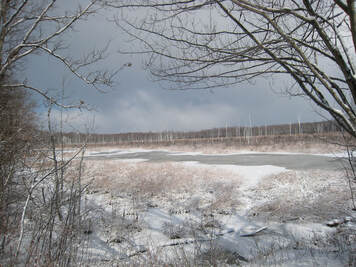 It was really, REALLY cold. It was really, REALLY cold.
And this wasn't the first time I'd gotten turned around on the notoriously ill-marked trails in the Cleveland area. Or been unable to find a trailhead with sketchy directions from the internet. Then came AllTrails. Queue rescue-themed music. AllTrails has been wonderful, and really opened up my access to trails in the Cleveland, OH and surrounding areas. Trails I doubt I would have found, or had the courage to try, without it. AllTrails is awesome - You can select what you want out of a trail and search for it - distance from your home, dogs allowed, length of hike, trail bike accessibility, difficulty, etc. This makes it a great tool for folks with disabilities that need to know if a trail is paved, if there are amenities at the trail head, etc. A nice bonus is that you're able to read reviews and see pics of the trail - great way to check for mud or other problems like downed trees/washed out trails. And it's free. Hiking and outdoor adventuring is already prohibitively expensive for many, and anything that removes additional spending is great (pro-version is $2.50 a month, and gives you access to download/print different topo maps). You can use it to track yourself AND record your hike while on the trail, even when your phone is in airplane mode. AllTrails also has a directions option that will open your phone's GPS app and take you right to the trail head. This is A-mazing. Previously, I found myself constantly lost on back roads, and a few times I even gave up on the hike. As a new hiker finding remote trailheads was incredibly frustrating. It helps build confidence, since you can view nearly all the trails immediately around you, allowing you to add/shorten your hike as you want or need to.
There are a couple downsides to AllTrails to keep in mind - it's not always 100% accurate in regards to length of the trail. I find the trails are often a half mile to a mile longer than indicated.
Keep in mind the difficulty rating of the trail tends to vary wildly. I did a 9 mile moderate trail last weekend, which was, to my surprise, easily and quickly accomplished even though it was pouring rain and I had to take a lot of breaks. Whereas I did a trail a few months ago that was five miles and very hilly, difficult terrain. Both were rated as moderate. I always encourage folks to have a printed map with them as well, and to understand how to read it, especially if you're in larger parks/national forests. Despite these issues, I recommend AllTrails for the access it provides. Have you ever gotten lost on the trail? Do you use an app or stick with a map, or both? Comment below, or feel free to contact me here! This is my favorite hike at the moment. There are parts where I really feel in the woods, and because of the varied, beautiful scenery I like to pretend I’m like Anne of Green Gables, giving unique, totally overblown names to all the different sections. 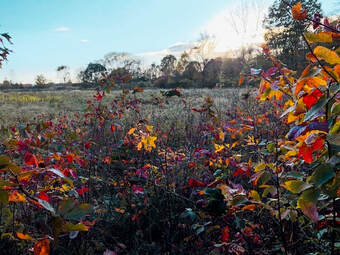 When I started hiking again, I was self-conscious and had a lot of anxiety about it. I had to go slowly, take a lot of breaks, and the hiking clothes, while awesome, were still more form fitting than I wore at the time. Plus, I was a fat girl, all alone, trying to figure out how to be on the trails. I didn’t really want to constantly run in to dudes on the trail that inevitably give me the look. Or would say things in a patronizing manner like, “Only a few more miles to go! Don’t stop, keep working up that sweat!” Uh, thanks random guy. I wanted to take my dog, enjoy the outside, and figure shit out for myself without worrying about what others were thinking/going to do. And that’s what Sagamore Creek Loop provided….. 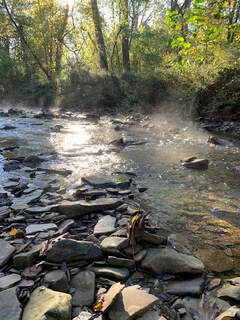 Location The Sagamore Creek Loop Trail head is located at 7733 Canal Rd, Valley View, OH 44125 (Frazee House Parking Lot) and is part of the Bedford Reservation, near Bedford, OH. The easiest way to access the trail head is behind the outhouse, and take a left when you get to the bottom of the incline. The Good
The Bad
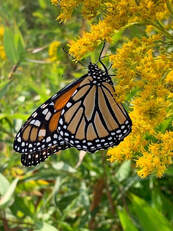 Note: At the beginning of the hike, you'll pass a place on the right where you can cross the creek. You'll do this at the end of the hike to complete the loop - I mention this because the alternative ending on the other side is NOT crossing the creek, but a muddy bog and ending the hike with a quarter mile walk on a main road.
The Ugly
Accessibility: Not wheelchair accessible. Sagamore Creek Loop remains, by far, one of my favorite hikes. When I first really managed to get hiking again, Sagamore provided the reclusive atmosphere I yearned for, where I first recognized that I could this outdoor thing, despite the pain/anxiety/etc. It’s the first trail I ever completed a night hike on. It will forever hold a special place in my heart. Do you have an outdoor space that’s special for you? Leave a comment or drop me line here! The video at the top of this post is how I envision night hiking - always ready to FLEE. As the days begin to cool and the temperatures drop, the sun dips out of sight faster and faster. And it's *F83king* scary. I normally hike alone, which as a misfit hiker, already puts me on high alert thanks to the unique hazards that poses. This post is specifically about night hiking for beginners......who hit those dark and dusty trails all alllooooonnnne. If you have an active imagination like I do, you literally think the worst the whole time. Aliens. Monsters. There are two reoccurring images that constantly pop in to my head as I'm hiking in the complete blackness of the forest. First, that I'll turn around and there will be someone just standing on the trail, legs slightly apart and head cocked, and they'll be staring at me. Not moving. Just standing. The second image is that someone will come running full sprint through the woods at me, like in "Get Out." The third is it will be like the Blair Witch and I'll stumble upon a cabin in the middle of the woods. The fourth is I'll be walking, and just keep walking. And walking. And walking. And the trail won't go anywhere. Okay, so maybe more than 2....  The Gamork The Gamork The dark has always been an awful and terrifying thing for me, every since my father terrorized my fragile five-year-old mind by stalling the car out on a wood-lined dirt road and yelling about how the Gamork (the monster in the Neverending Story was about to get us. He'd then "manage" to get the car started and would careen down the road to our house. You know, tender moments of parental bonding that last a lifetime. But as the sun fades quicker, I don't want to find myself limited to hiking on the weekends. I want to still be able to go after work. So what do I do to prepare myself mentally and so I'm physically safe when I'm out hiking alone?  1. Headlamp: I bring a lightweight headlamp with me, and I make sure I have extra batteries. I use the Black Diamond Spot Lite 160, from REI, which was a cheap $26.00 bucks and has done me well. 2. Know Thy Trail: I wouldn't recommend doing an unfamiliar area in complete darkness. Does it take some of the scary fun out of it? Yes, but losing your footing on some loose shale and snapping your neck falling down a cliff will ALSO put a damper on the fun. 3. Choose Carefully: The trails I head out on at night are ones that are moderately difficult, but not crazily technical. As a night-hiker beginner, I only do trails at night if I've hiked them a number of times in the light, after reading reviews and having an idea of the general safety of the area. I also familiarize myself with the wildlife, so I know what's going to be scuttling around me. Why take chances? 4. Cell Phone: I carry a fully charged cellphone with me so I can call for help if I need to, and it gives me a backup light. If you're going in to really remote areas, get a personal GPS - to figure out the right one for you, check out this article from REI. 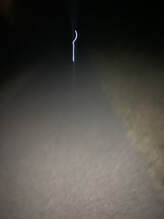 No idea wtf this random light was and I try not to think about it. No idea wtf this random light was and I try not to think about it. 5. Implements of Safety: get a small canister of pepper spray. I won't link what I have, because it doesn't have a keychain/way to connect it, and I wish it did. Make sure you can attach it somewhere, because the one instance I really needed it I couldn't get it out of my pocket in time. Pepper spray will help defend against coyotes, dogs, wayward hilljacks, etc. I carry 2 to 4 oz. I also carry a small knife. Though the rule of thumb is if someone/something (i.e. Pennywise) can get that close to you, you're probably &^%$$ anyway. 6. Hike Buddy: Make sure someone knows where you're going, when you start, and when you plan to be done. Every. Single. Time. If nothing else, they talk you down when you see crazy *&^% on the trail at night (see image on right) 7. Hiking Poles: I always use hiking poles, especially in the dark. Helps me keep my footing, and has saved me from tripping and falling a number of times. *Always take your regular gear, too, like water and a map. 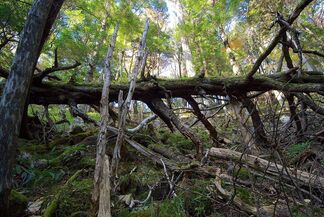 Once I'm on the trail, I check behind me at regular intervals (about every 50 feet). I don't wear ear buds for my book on tape, for two reasons: so night runners, etc. will know there's someone else around and so I can listen more acutely. I also keep an eye out upward for any potential deadfall (branches or trees about to come down on my head). You want to be extra careful during hunting season, that some yahoo poaching deer doesn't mistake you or your dog for the big kill of the season. Be sure to check local park pages to see what's in season and when. At night, consider reflective gear, too. Some folks like to turn off their headlamps and hike in complete darkness. That isn't me. Besides my imagination, it's a safety issue for me, as I hike in areas with a lot of rocks and tree roots. And monsters that I want to be able to see coming. If you're like me, and your imagination can carry you in scary, unhelpful directions, have a phrase you can repeat to redirect your attention. I like a line from Stephen King's "The Stand" - He thrusts his fists against the post and still insist he sees the ghost. And finally, have fun! Night hiking isn't for everyone, but if you're willing to try it, it is a TOTALLY different experience. I'll be sure let you know if it gets any less scary! Do you hike at night? Have a good story of terror in the darkness of the trail? Have any additional tips for hiking at night or have a question? Post away or contact me here! |
Archives
March 2021
Categories
All
|
